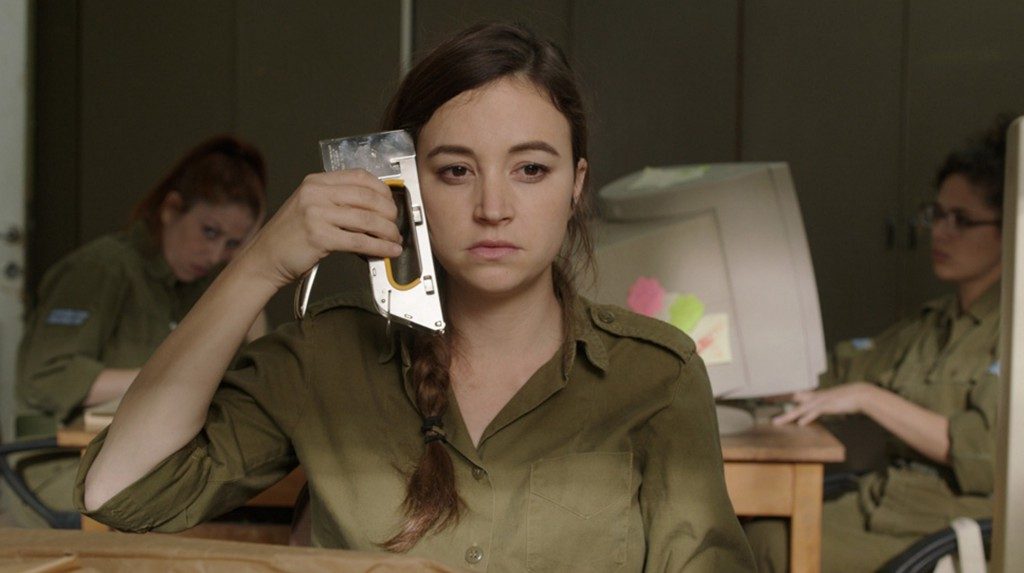Since winning the 2014 Tribeca Film Festival’s top prize (and the Nora Ephron award), Talya Lavie’s debut film, Zero Motivation, has become a critical darling. Currently boasting a 88% score on Rotten Tomatoes, the Israeli female-friendship comedy focuses on a trio of young female soldiers battling against the social claustrophobia and mild-insanity-inducing boredom of compulsory military service shredding paper and fetching coffee at a remote desert outpost. Currently out in theaters, Zero Motivation balances humor, drama, and just a little bit of action (involving dueling staple guns) in an unique and (according to some) necessary coming-of-age tale.
Women and Hollywood spoke with Lavie about her experiences as a soldier, adding a female POV to the male-dominated army genre, and why she wasn’t too worried about the Israeli military’s response to her film.
Women and Hollywood: Talk about your motivation for making this film?
Talya Lavie: During my
mandatory military service as a secretary, I dreamed of making an army movie
with the pathos and epic [scale] of classic war-films — but about the gray,
mundane service that my friends and I experienced, where we hardly ever got up
from our office chairs. I was inspired and amused by the idea of using
envelopes, coffee cups, office intrigues, staple guns, and solitaire in order to
create a female response to the Israeli male-dominated army film genre.
W&H: Are these types of jobs strictly the ones that women get stuck
with? Are you trying to make a political statement about the roles of women in
the army ?
TL: Although the film
is set in the army, it’s not about the army. I referred to the little
office [where the film takes place] as a glimpse into Israeli militaristic society. The Israeli Defense
Forces (IDF) is a major institution that affects all parts of society,
culturally and politically.
W&H: Is there controversy in Israel over the compulsory service?
Do you see it changing anytime soon?
TL: It’s probably not
going to change as long as there are violent conflicts in the area and as long
as certain parties benefit financially and strategically from keeping the
situation as it is. So unless a miracle happens, it looks like it will remain
the status quo.
W&H: You’ve won multiple awards in Israel for the film, so it
clearly touched a chord. Why do you think it has resonated so much?
TL: First, the film
has a great cast, and people were very much engaged with the characters. Also,
I think the film is very authentic, and people in Israel felt that it
was made for them, not made to “please” foreign eyes. The army
experience for Israelis is, in a way, like college for Americans. We have quite
a tradition of army films in Israel, but not so much about those pencil
pushers. So many people told me that the film was necessary for them, and that
is my biggest award.
W&H: How did you develop the script, and why did you set it in
2003–2004?
TL: I chose to set the
film in this period because of a few events that occurred then: the IDF
transitioned from using only paperwork to having an IDF internet. Zohar, [one of the three main characters,] is a postal [staff worker] and is surrounded by paperwork and envelopes. At the end of the
film, when she is about to be discharged from army service, she finds out that
she doesn’t have a substitute, because the office is [transitioning to] email service
instead.
Additionally, women soldiers started taking part in guard-duty rotations around
that time, and, as we can see in the film, the secretaries receive gun training.
It was an IDF step toward equal rights. Also, the officers’ training course,
which was separate for men and women, merged into one course during that period.
W&H: What were the biggest challenges for you in making the
film?
TL: My greatest
challenge was to maintain the specific, subtle tone of the film — to balance the
transitions between humor, sadness, nonsense, and seriousness. I felt like an
acrobat in a circus walking on a tightrope, trying not to fall off, and yet to
keep the film’s free spirit.
W&H: Were you nervous at all that the army would be upset?
TL: I was nervous
about so many things that I can’t really remember exactly how worried I was
about each and every issue. I assumed that the army wasn’t going to be crazy
about the film. But it’s quite common in Israel to make army jokes, so I didn’t
think that I’d become their biggest problem.
W&H: You also won several awards at the Tribeca Film Festival, including the Nora
Ephron award. Did that open new doors for you?
TL: Winning the Nora
Ephron Award was such a great honor, regardless of what influence it may have,
since she’s such a role model and a huge inspiration. The awards at the Tribeca Film
Festival were very helpful in getting people to pay attention to the film, both
in Israel and around the world. The film premiered there, and I couldn’t imagine
a better start for it.
W&H: Do you have any advice for other female filmmakers?
TL: Focus on what
interests you, do everything to excel, and don’t let any small, irrelevant
things stand in your way (I could probably say the same thing to a man, but
what the hell.)






